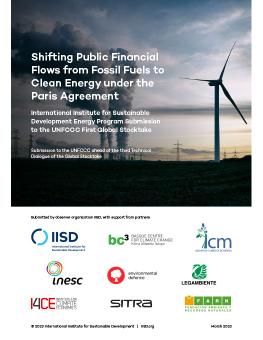
Shifting Public Financial Flows From Fossil Fuels to Clean Energy Under the Paris Agreement
International Institute for Sustainable Development Energy Program Submission to the UNFCCC First Global Stocktake
The first UNFCCC Global Stocktake process-which will conclude at COP28 in Dubai-intends to evaluate progress towards achieving the goals of the Paris Agreement and increase national ambitions to speed up climate action. This report is the IISD Energy Program's submission to the first Global Stocktake, assessing global progress made on shifting public finance flows from fossil fuels toward clean energy. It finds that despite the countries' pledges, fossil fuel subsidies have continued to rise since 2015—exceeding USD 1 trillion for the first time in 2022—and provides recommendations to help overcome challenges to shifting public financial flows towards clean energy.
This submission to the first formal United Nations Framework Convention on Climate Change Global Stocktake provides evidence of the extent to which parties have made progress on aligning public financial flows—including subsidies, investments by state-owned enterprises (SOEs), and lending from public financial institutions—with the need to reduce emissions in line with climate targets.
Commitments on shifting financial flows have not fared well during the COVID-19 and energy crises. According to the Fossil Fuel Subsidy Tracker, fossil energy subsidies reached USD 732 billion in 2021, 35% higher than in 2015, the year of the Paris Agreement (USD 543 billion). They further jumped to USD 1.1 trillion in 2022, according to the International Energy Agency's preliminary estimate that does not cover all countries and includes only consumer subsidies, so the final value of fossil fuel subsidies for 2022 will be even higher.
Yet, fossil fuel subsidies hinder the implementation of the Paris Agreement because they create incentives to produce and consume more fossil fuels, increasing greenhouse gas emissions. They also they skew the level playing field for investing in and deploying clean energy technologies. It is sometimes claimed that they are needed to support low-income households—while research shows that the biggest benefits often accrue to the wealthiest groups.
These subsidies are also often extremely costly, consuming public resources that could instead be used to support the poor more efficiently (such as health and education services) or to address climate change mitigation and adaptation.
Shifting public support away from fossil fuels can be a source of positive social and environmental changes, but in many cases, it needs to be carefully planned or it can have negative socioeconomic impacts.
The following steps can help overcome challenges to shifting public financial flows towards clean energy:
- Improving the state of transparency.
- Improving the accountability of global commitments on shifting public support from fossil fuels to clean energy.
- At the national level, good planning is essential: getting the prices right, managing impacts, and building support.
You might also be interested in
Carbon Minefields: Oil and gas exploration surging to pre-Covid levels
Oil and gas exploration is booming despite an agreement at last year’s COP 28 climate summit to transition away from fossil fuels.
July Edition | Carbon Minefields Oil and Gas Exploration Monitor
In June 2024, six governments issued 18 oil and gas exploration licences with embodied emissions of 14.7 MtCO2, led by Russia and China.
New Agreement Marks First Step in Addressing Energy Charter Treaty Legacy
This is an important move to prevent legacy arbitration claims under the treaty, but more remains to be done.
The Indonesia Cooking Diaries Study
This study evaluates the feasibility and implications of switching from cooking with LPG to induction stoves in Indonesian households.